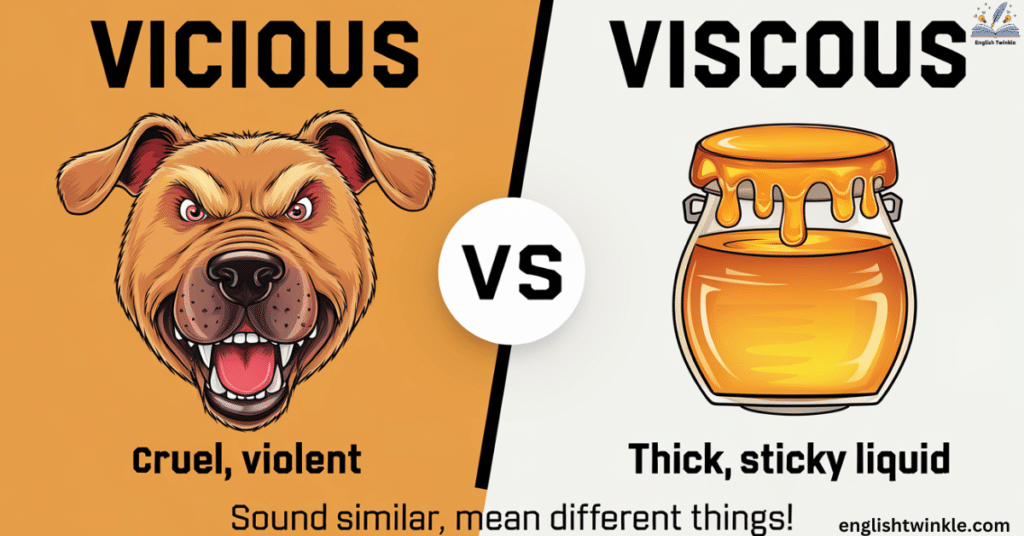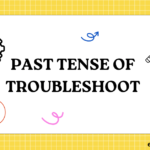In the vast ocean of the English language, certain words can trip us up like hidden reefs. “Vicious” and “viscous” are two such terms that often lead writers astray. Though they sound similar, their meanings couldn’t be more different. Let’s dive into the depths of these words, exploring the “Vicious vs Viscous” distinction, their origins, meanings, and proper usage to ensure your writing remains clear, precise, and impactful.
The Sticky Situation of Similar-Sounding Words
We’ve all been there – poised to write a sentence, only to hesitate between two words that sound alike but mean entirely different things. This confusion isn’t just a matter of spelling; it’s a crossroads where meaning and intention intersect. The mix-up between “vicious” and “viscous” is a prime example of how similar-sounding words can muddy the waters of clear communication.
The Power of Precision in Language
Before we delve into the specific differences between “vicious” and “viscous,” it’s worth considering why such precision matters. In an age of rapid communication and information overload, the ability to convey exact meaning is more crucial than ever. Whether you’re crafting a scientific paper, writing a novel, or composing a business email, choosing the right word can make the difference between clarity and confusion, impact and indifference.
Why “Vicious” and “Viscous” Trip Us Up
The root of the problem lies in the phonetic similarities between these two words. Both start with the same “vi” sound and end with a hissing “s”. For many, especially those who don’t frequently use “viscous” in their everyday vocabulary, the distinction can be blurry.
Moreover, context clues, often our saving grace in deciphering meaning, can sometimes fail us here. Imagine a sentence like “The substance had a ___ nature.” Both “vicious” and “viscous” could potentially fit, albeit with drastically different implications.
The Role of Homophones in Language Confusion
“Vicious” and “viscous” aren’t true homophones, but they’re close enough to cause confusion. This phenomenon is not uncommon in English, where words like “their,” “there,” and “they’re” or “to,” “too,” and “two” frequently trip up writers. Understanding the mechanics of why we confuse these words can help us develop strategies to avoid such mistakes.
Vicious: When Words Bite Back

“Vicious” is a word that packs a punch. It’s derived from the Latin word “vitiosus,” meaning faulty or defective. Over time, its meaning has evolved to describe something much more aggressive and harmful.
Definition and Core Meaning
In modern usage, “vicious” typically describes:
- Deliberately cruel or violent behavior
- Severe or intense negative qualities
- Marked by deep-seated ill will
Common Usage in Everyday Language
We often encounter “vicious” in descriptions of:
- Behavior: A vicious attack, a vicious argument
- Animals: A vicious dog, a vicious predator
- Cycles or Systems: A vicious cycle of poverty
- Weather: A vicious storm
- Criticism: Vicious remarks, vicious rumors
Psychological and Sociological Contexts
In psychology and sociology, “vicious” often describes behaviors or systems that are self-perpetuating and harmful. For instance, the “vicious cycle of addiction” refers to the way substance abuse can lead to more problems, which in turn fuel further substance abuse.
The Impact of Vicious Language
Words have power, and “vicious” is a prime example. When we describe something as vicious, we’re not just saying it’s bad – we’re evoking images of cruelty, violence, and intense negativity. This can be a powerful tool in writing, but it’s one that should be used judiciously. Overuse can dilute its impact, while appropriate use can create vivid, lasting impressions on your readers.
Viscous: The Science of Stickiness

While “vicious” deals with behavior, “viscous” is all about physical properties. It comes from the Latin “viscosus,” meaning sticky.
Definition and Physical Properties
“Viscous” describes a substance that:
- Has a thick, sticky consistency
- Flows slowly
- Is resistant to changes in form
Applications in Various Fields
The concept of viscosity is crucial in many scientific and industrial applications:
- Chemistry: Measuring the flow properties of liquids
- Biology: Understanding blood flow and cellular movements
- Engineering: Designing lubricants and hydraulic systems
- Geology: Studying magma flow and glacier movements
Everyday Examples of Viscosity
You encounter viscous substances more often than you might think:
- Honey
- Molasses
- Motor oil
- Shampoo
- Ketchup
The Science Behind Viscosity
Viscosity is a measure of a fluid’s resistance to flow. It’s determined by the friction between the molecules of the fluid. The more friction, the higher the viscosity. Temperature can significantly affect viscosity – most liquids become less viscous (more fluid) as they heat up, while gases become more viscous at higher temperatures.
Face-Off: Vicious vs Viscous
To truly master these words, let’s compare them side by side:
| Aspect | Vicious | Viscous |
|---|---|---|
| Pronunciation | VISH-us | VIS-kus |
| Part of Speech | Adjective | Adjective |
| Primary Meaning | Cruel, violent | Thick, sticky |
| Etymology | Latin “vitiosus” (faulty) | Latin “viscosus” (sticky) |
| Connotation | Negative | Neutral (scientific) |
| Common Contexts | Behavior, criticism, systems | Science, cooking, materials |
| Related Nouns | Viciousness | Viscosity |
Memory Tricks for Differentiation
To keep these words straight, try these mnemonic devices:
- “Vicious” has two “i”s, like two angry eyes glaring at you.
- “Viscous” shares its “sc” with “science,” where it’s commonly used.
- Think “Vicious Villain” vs “Viscous Vanilla” (as in thick, creamy vanilla pudding)
In Action: Examples that Stick
Let’s see these words in context to cement our understanding.
Vicious in Literature and Media
- “The vicious dog bared its teeth, ready to attack.” – This sentence evokes a sense of immediate danger and aggression.
- “The critics were vicious in their review of the new play.” – Here, “vicious” implies harsh, cutting criticism.
- “A vicious rumor spread through the office, damaging reputations.” – This usage highlights the harmful nature of malicious gossip.
- “The vicious storm tore through the town, leaving destruction in its wake.” – This describes the violent, destructive nature of the weather.
- “Her vicious temper made everyone wary of crossing her.” – Here, “vicious” describes an extremely negative personality trait.
Viscous in Scientific Papers and Cookbooks
- “The viscous magma flowed slowly down the volcano’s slope.” – This describes the thick, slow-moving nature of the lava.
- “Add the egg to create a more viscous batter for your pancakes.” – In cooking, viscosity often relates to the desired consistency of mixtures.
- “The viscous properties of motor oil change with temperature.” – This scientific usage relates to the flow characteristics of the liquid.
- “The researcher studied the viscous nature of various polymers.” – This highlights the use of “viscous” in materials science.
- “The viscous syrup dripped slowly from the bottle.” – This everyday example illustrates the slow-flowing nature of viscous substances.
Common Phrases and Idioms
- Vicious:
- “Vicious circle”
- “Vicious tongue”
- “Vicious competition”
- “Vicious blow”
- “Vicious streak”
- Viscous:
- “Viscous flow”
- “Highly viscous fluid”
- “Viscous drag”
- “Viscous forces”
- “Viscous deformation”
Beyond the Basics: Expanding Your Vocabulary
To truly enrich your writing, it’s helpful to explore related terms and synonyms.
Synonyms and Related Terms
| Vicious | Viscous |
|---|---|
| Cruel | Thick |
| Brutal | Sticky |
| Ferocious | Syrupy |
| Malicious | Gelatinous |
| Violent | Gummy |
| Spiteful | Glutinous |
| Nasty | Ropy |
| Merciless | Mucilaginous |
| Inhuman | Treacly |
Antonyms: Exploring Opposites
| Vicious | Viscous |
|---|---|
| Kind | Fluid |
| Gentle | Runny |
| Benevolent | Thin |
| Merciful | Watery |
| Compassionate | Liquid |
Word Families and Derivatives
Understanding the word families can further enhance your grasp of these terms:
Vicious:
- Noun: Viciousness
- Adverb: Viciously
- Related: Vice, Vitiate
Viscous:
- Noun: Viscosity
- Adverb: Viscously
- Related: Viscid, Viscose
The Evolution of Language: From Origin to Modern Usage

Language is a living entity, constantly evolving. The journey of “vicious” and “viscous” from their Latin roots to modern English is a fascinating study in linguistic evolution.
Historical Usage of “Vicious”
Originally meaning “faulty” or “defective,” “vicious” gradually took on stronger negative connotations. By the 14th century, it was being used to describe moral depravity. Its current usage, focusing on cruelty and violence, became prominent in the 17th century.
Timeline of “Vicious”
- 14th Century: Enters English from Latin, meaning “faulty” or “corrupt”
- 15th Century: Begins to be associated with moral failings
- 17th Century: Takes on its modern connotations of cruelty and violence
- 20th Century: Widely used in popular culture to describe extreme negativity
Development of “Viscous” in Scientific Discourse
“Viscous” entered the English language later, in the 15th century. Its usage remained primarily scientific, becoming increasingly important as fluid dynamics and material sciences advanced. The term gained broader recognition with the rise of industrial lubricants and food science in the 20th century.
Timeline of “Viscous”
- 15th Century: Enters English from Latin, describing sticky substances
- 17th Century: Begins to be used in scientific contexts
- 19th Century: Becomes crucial in the study of fluid dynamics
- 20th Century: Widely applied in various scientific and industrial fields
Mastering the Art: Tips for Proper Usage
To use these words effectively, consider the following strategies:
- Context is Key: Always consider the surrounding content. Are you describing behavior or physical properties?
- Check Your Subject: If you’re talking about a person or animal’s actions, you’re likely using “vicious.” If it’s about a substance’s flow or consistency, “viscous” is your word.
- Read It Aloud: Often, our ears can catch mistakes our eyes miss. If it sounds off when you say it, double-check your usage.
- Use a Thesaurus: If you’re unsure, look up synonyms. They can often clarify which word you need.
- Consider the Tone: “Vicious” carries strong negative connotations. Make sure it’s not too strong for your intended meaning.
- Precision in Scientific Writing: In scientific contexts, be especially careful with “viscous.” It has a specific meaning that shouldn’t be confused with other properties.
Case Study: The Importance of Word Choice
To illustrate the impact of choosing between “vicious” and “viscous,” consider this case study:
A food critic was reviewing a new restaurant’s signature sauce. In his first draft, he wrote:
“The sauce had a vicious consistency that clung to the palate.”
This sentence conveys an unintended meaning, suggesting the sauce was somehow cruel or violent. After revision, the critic wrote:
“The sauce had a viscous consistency that clung to the palate.”
This correction accurately describes the sauce’s thick, sticky texture without any negative connotations about its taste or quality.
Beyond Words: The Impact of Precision in Language
The distinction between “vicious” and “viscous” is more than just a matter of correct spelling. It’s about the power of precise communication.
In professional settings, using the right word can be the difference between clarity and confusion. Imagine a scientist describing a “vicious fluid” instead of a “viscous” one – it completely changes the meaning and could lead to significant misunderstandings.
In creative writing, the choice between “vicious” and “viscous” can set entirely different tones. A “vicious storm” evokes images of violence and danger, while a “viscous fog” creates an atmosphere of slow-moving, oppressive thickness.
The Role of Precision in Various Fields
- Science and Technology: Accurate terminology is crucial. Misusing “viscous” could lead to errors in calculations or misunderstandings of material properties.
- Law: In legal documents, the difference between “vicious” (as in a vicious dog) and “viscous” could have significant implications in a case.
- Journalism: Precise language ensures accurate reporting. Describing a political attack as “vicious” carries very different implications than if it were mistakenly called “viscous.”
- Medicine: Clear communication can be a matter of life and death. A “vicious cycle” of symptoms is very different from a description of “viscous” bodily fluids.
- Business: In marketing or product descriptions, using the right term can make or break a sale. A “viscous” hair gel is a selling point; a “vicious” one would be alarming!
Wrapping Up: The Viscous Nature of Vicious Words

As we’ve seen, the journey from confusion to clarity when it comes to “vicious” vs “viscous” is a fascinating exploration of language, science, and communication. By understanding the origins, meanings, and proper usage of these words, we equip ourselves with the tools to write more precisely and effectively.
Remember:
- “Vicious” deals with cruelty, violence, and intense negativity.
- “Viscous” describes the physical property of thick, sticky substances.
The next time you encounter these words, you’ll be well-prepared to use them correctly, ensuring your writing flows smoothly – much like a perfectly viscous substance – and hits hard when necessary, like a vicious argument for linguistic precision.
The Broader Implications
This exploration of “vicious” and “viscous” serves as a microcosm of the larger challenges and joys of language. Every word we choose carries weight, history, and nuance. By honing our understanding and usage of words, we not only improve our own communication but also contribute to the rich tapestry of language itself.
As writers, we bear the responsibility of using language thoughtfully and accurately. Whether we’re crafting a scientific paper, a legal brief, a novel, or a simple email, our word choices shape understanding, influence emotions, and sometimes even change the world around us.
Interactive Elements
To test your understanding, try this quick quiz:
- Which word would you use to describe honey?
- If someone spread malicious rumors, would they be vicious or viscous?
- In a scientific paper about fluid dynamics, which word is more likely to appear?
- Would you describe a cruel dictator as vicious or viscous?
- If a chef wants a sauce to coat the back of a spoon, is he looking for a vicious or viscous consistency?
(Answers: 1. Viscous, 2. Vicious, 3. Viscous, 4. Vicious, 5. Viscous)
Challenge: Create Your Own Mnemonic
Come up with your own memorable way to distinguish between “vicious” and “viscous.” Share it with friends or colleagues to help spread clear communication!
Additional Resources
For further exploration of language and writing, consider these resources:
- “The Elements of Style” by Strunk and White
- “On Writing Well” by William Zinsser
- The Merriam-Webster Dictionary app for quick reference
- “The Language Instinct” by Steven Pinker for a deeper dive into linguistics
- Online courses in creative writing or scientific writing, depending on your interests
Remember, language learning is a lifelong journey. Each word mastered is a step towards more powerful, precise communication. So keep exploring, keep questioning, and most importantly, keep writing!
As we conclude this deep dive into the world of “vicious” and “viscous,” take a moment to appreciate the richness of language. These two words, so similar in sound yet so different in meaning, exemplify the complexity and beauty of English. By mastering such nuances, we not only become better writers but also more effective communicators in all aspects of life.
Whether you’re a student, a professional, or simply someone who loves language, remember that every word is a tool. Choose your tools wisely, use them skillfully, and watch as your ability to express ideas and connect with others grows. The journey of language learning never truly ends – it’s a viscous flow of knowledge that can sometimes feel like a vicious challenge, but always leads to growth and understanding.

Freck John, linguist and English educator, shares grammar insights and writing tips at English Twinkle, making language concepts accessible to all learners.







